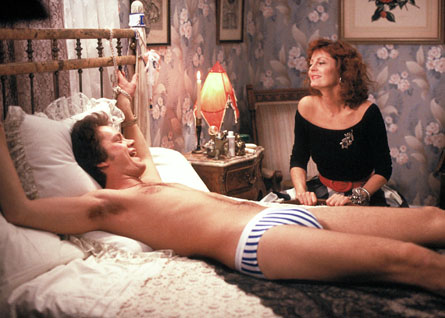
Ready for some Walt Whitman
Film Friday
The World Series between the Texas Rangers and the San Francisco Giants gives me an excuse for posting on what is, in my opinion, the greatest movie on baseball. Among the many virtues of Ron Shelton’s Bull Durham are its literary allusions and its literariness.
Each year Annie Savoy (Susan Sarandon) chooses to sleep with a promising young player on the Durham Bulls, a minor league team. This particular season she fixes upon pitcher Ebby LaLoosh, a player who has a “million dollar arm but a five cent head.” The club also signs Crash Davis, an aging catcher, to help with Ebby’s development. Between them, Annie and Crash give Nuke the education he needs.
At the start of the film Annie sets out her beliefs in a rambling, mind-expanding monologue:
I believe in the Church of Baseball. I’ve tried all the major religions, and most of the minor ones. I’ve worshipped Buddha, Allah, Brahma, Vishnu, Siva, trees, mushrooms, and Isadora Duncan. I know things. For instance, there are 108 beads in a Catholic rosary and there are 108 stitches in a baseball. When I heard that, I gave Jesus a chance. But it just didn’t work out between us. The Lord laid too much guilt on me. I prefer metaphysics to theology. You see, there’s no guilt in baseball, and it’s never boring… which makes it like sex. There’s never been a ballplayer slept with me who didn’t have the best year of his career. Making love is like hitting a baseball: you just gotta relax and concentrate. Besides, I’d never sleep with a player hitting under .250… not unless he had a lot of RBIs and was a great glove man up the middle. You see, there’s a certain amount of life wisdom I give these boys. I can expand their minds. Sometimes when I’ve got a ballplayer alone, I’ll just read Emily Dickinson or Walt Whitman to him, and the guys are so sweet, they always stay and listen. ‘Course, a guy’ll listen to anything if he thinks it’s foreplay. I make them feel confident, and they make me feel safe, and pretty. ‘Course, what I give them lasts a lifetime; what they give me lasts 142 games. Sometimes it seems like a bad trade. But bad trades are part of baseball – now who can forget Frank Robinson for Milt Pappas, for God’s sake? It’s a long season and you gotta trust. I’ve tried ’em all, I really have, and the only church that truly feeds the soul, day in, day out, is the Church of Baseball.
I’m trying to figure out which Emily Dickinson poems Annie would use on a young ball player. (I invite readers to send in suggestions.) On the other hand, the movie shows us how she uses Whitman. Annie handcuffs Ebby to a bed and proceeds to read to him from Leaves of Grass:
Ebby: Awright! I read about stuff like this. Bring it on!
Annie: Sweetie, have you ever heard of Walt Whitman?
Ebby: Who’s he play for?
Annie: Well, he sort of pitches for the Cosmic All-Stars.
Ebby: Never heard of ’em.
Annie: Good–then listen:
“I sing the body electric.
The armies of those I love engirth me and I engirth them–“
Ebby: We gonna fuck or what?
Annie: Shh, shh…
“They will not let me off till I go with them, respond to them,
And discorrupt them and charge them . . .”
Dissolve to same scene, later:
“Limitless limpid jets of love hot and enormous — quivering jelly of love, white blow and delirious juice . . .”
Unless Annie is reading excerpts, the poem at this point has gone on for sixty lines (which would explain the need for handcuffs). Incidentally, there’s another famous instance of someone using Leaves of Grass as foreplay: Bill Clinton with Monica Lewinsky.
Whitman also concludes the movie. Annie says,
Walt Whitman once said, “I see great things in baseball. It’s our game, the American game. It will repair our losses and be a blessing to us.” You could look it up.
Following Annie’s advice (“You can look it up” is also the advice of legendary Yankee manager Casey Stengel) I googled the quote. I found this expanded version:
I see great things in baseball. It’s our game – the American game. It will take our people out-of-doors, fill them with oxygen, give them a larger physical stoicism. Tend to relieve us from being a nervous, dyspeptic set. Repair these losses, and be a blessing to us.
Whitman’s remarks remind me of Willa Cather on football, which I wrote about recently.
One last literary quote from the movie: At one point Annie tells Crash that she lives her life according to William Blake’s maxim, “The road of excess leads to the palace of wisdom,” one of the “Proverbs of Hell” from Marriage of Heaven and Hell. By hell, Blake means outside established thought and religion, and his work, like Whitman’s, gives Annie the courage to step outside of her staid rural North Carolina environment. Poetry allows her to imagine herself as a free spirit. I would expect that she also takes to heart a related passage in Heaven and Hell, “Those who restrain desire, do so because theirs is weak enough to be restrained.” Annie does not see herself as weak.
By the end of the film, however, it is not only Ebby who has grown up. Annie decides to stop sleeping with young ball players and Crash decides it is time to move from playing to managing. They also turn to each other in what promises to be a solid and mature relationship. Both have intelligence, imagination, and baseball savvy, prompting me to think of another of Blake’s proverbs: “The soul of sweet delight can never be defil’d.”
One Trackback
[…] Walt Whitman, William Blake, and Baseball […]